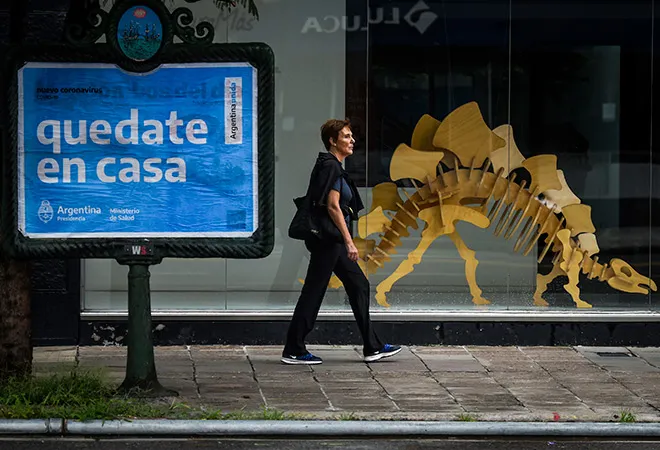
The Covid19 pandemic has been part of public and private discourse in Argentina since January. In February, news reports began focusing more on the situation in China, and alerts over the possible spread of the virus started to increase. But it was only in mid-March that the Argentine government took action, beginning with a series of official announcements about the pandemic. From that moment on, the entire country — barring a few who closed their eyes to the pressing situation — became aware of the risks.
The first official order for quarantine came on 20 March, after some previous failed attempts at getting people, especially those who had travelled abroad or came into contact with someone who had, to stay at home voluntarily. A few Argentine travellers underestimated these warnings, forcing the government to take harsher measures. Argentina was the first country in Latin America to order a mandatory quarantine period. Self-isolation is tough for Argentines since we aren’t necessarily discipline-abiding. And so, law enforcement officers have been put into action to ensure people aren’t continuing with their regular routines despite the emergency public policies.
With practically all activities at a standstill now, April has shown just how the country can handle the pandemic. The government is regularly communicating with the people, with the latest updates and directions. The private sector (stores, industry, banks) is working, albeit in a limited capacity. E-transactions have turned out to be a problem given the weak infrastructure and a lack of digital literacy. Working from home has been incorporated but comes with the usual struggle of people not knowing how to take full advantage of digital resources. Students too have turned to e-learning.
The results of public health measures offer some hope, especially in comparison to other Latin American countries such as Mexico and Chile, which had a very delayed political response to the pandemic. As of 8 April, about 1715 people have been infected by the Covid19 virus, with 60 deaths, according to Argentina’s public health ministry. We are a country of 48 million people, so these figures are promising.
Some of the measures taken by the government to tackle the virus and help the people include:
- Converting public spaces like amusement parks into hospitals
- Providing subsidies to independent workers, freelancers and people employed in informal work
- A freeze on the prices of primary commodities, including food and cleaning products
- Congresspersons donating their wages for investment in public health
The central government is working closely with the provincial governments to adjust the local policies in line with the federal measures.
One of the most concerning problems during this time is violence against women in Argentina. Sixteen women have died due to domestic violence in the last three weeks, and the reports of gender-based violence cases channelled through the official national helpline have risen by 39% since the quarantine began. For many women, the Covid19 virus is not the only concern, they must face violence from the men they live with as well. Many women must simply be hoping to survive the quarantine after living under the same roof with their abusers for days.
The government automatically renewed the protective measures for women in vulnerable situations such as panic devices, warrants and court orders against their attackers, but this is still insufficient to prevent them from harm. Many people remain focused on their everyday needs — connecting with their loved ones, social media and paying bills online. In the big cities, people express their gratefulness to public health personnel by clapping at their windows every day.
I like to believe that they’re also supporting feminist activists who have not stopped working despite the quarantine and continue to save lives every day, perhaps in worst conditions than before. The thousands clapping hands make me smile some days when I think there might be one or two others who think like me. That’s how one can go to bed, knowing a better time is still to come. The Covid19 pandemic has emphasised our priorities, but there is a lot to acknowledge culturally. It is in these times that we need to learn the importance of strong political leadership, the need for digital literacy, as well as to be more sympathetic and considerate.
The views expressed above belong to the author(s). ORF research and analyses now available on Telegram! Click here to access our curated content — blogs, longforms and interviews.




 PREV
PREV


